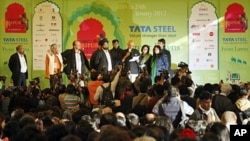The Indian organizers of the largest literary festival in Asia cancelled a televised speech by author Salman Rushdie just minutes before it was scheduled, due to the threat of violent protests.
Rushdie was set to address the Jaipur Literature Festival in the western Indian state of Rajasthan on Tuesday, but some Muslim groups opposed the speech.
The British-Indian author sharply criticized the Indian government following the decision to scrap his televised speech. Rushdie told an Indian news channel that he will come to India as many times as he chooses, and will not allow "these religious gangsters and their cronies in the government to prevent me."
Rushdie cancelled his visit to the festival last week after Indian intelligence officials told him that assassins were heading to Jaipur from Mumbai.
His 1988 book The Satanic Verses was considered blasphemous by many Muslim leaders. The Indian-born author spent years in hiding after Iranian leader Ayatollah Ruhollah Khomeini issued a fatwa (Islamic religious ruling) calling for his death. The book is still banned in India.
The festival's organizer, Sanjay Roy, said Tuesday that Muslim activists had gathered outside the festival entrance and protesters had infiltrated the crowd with plans to disrupt proceedings and cause violence should Rushdie address festival-goers via video link.
Roy said he felt hurt and disgraced but had no other choice but to cancel Rushdie's speech. The festival venue's owner, Ram Pratap Singh, said the decision was taken after being advised by Rajasthan police.
Rushdie suggested Tuesday that the government's reluctance to support his visit was connected to its desire to win Muslim votes in upcoming elections in India's most populous state, Uttar Pradesh.
Some of Rushdie's fellow authors at the event showed their support for him by reading out passages of the The Satanic Verses last week.
The five-day Jaipur Literature Festival ended Tuesday with thousands attending the annual event. More than 250 speakers also took part, including authors Michael Ondaatje, Tom Stoppard, Richard Dawkins and television host Oprah Winfrey.
Some information for this report was provided by AFP and Reuters.
| Join the conversation on our social journalism site - Middle East Voices. Follow our Middle East reports on Twitter and discuss them on our Facebook page. |




